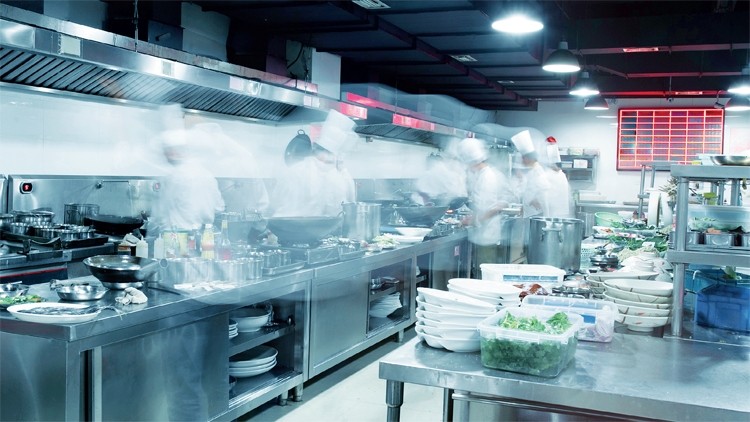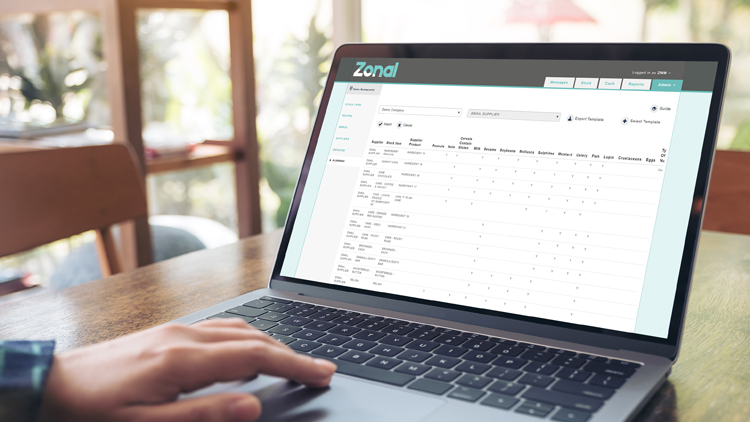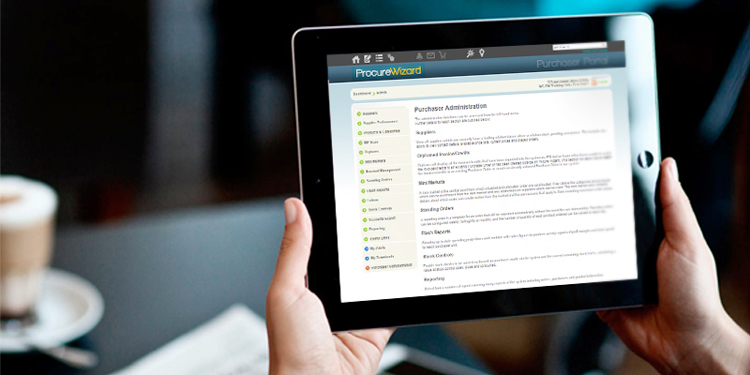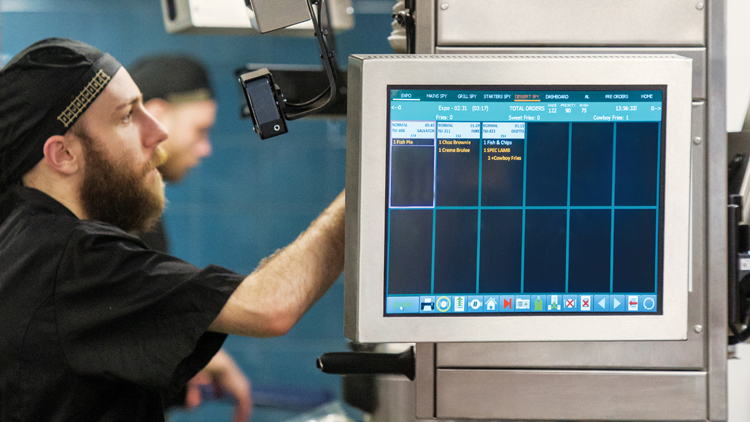Back to the future: the best behind-the-scenes restaurant tech

If you thought technological advancement were transformational for restaurants in the past decade, then wait until you see what the new decade has in store. Here, in our first technology report of the ’20s, we’re taking a look at the back of house functions and systems that are going to be the must-haves for savvy operators over the next year and beyond.
With consumers, politicians and business leaders very much focused on protecting the planet, restaurant operators will be – or at least should be – paying far more attention to sustainability in 2020.
Reducing food waste not only makes sense for the planet but also for your bottom line, and consumers are more likely to visit your restaurant if they know you follow good sustainable practices.
According to WRAP (the Waste and Resources Action Programme) the restaurant industry wastes 3.5 million tonnes of food every year, while 41% of waste from restaurants, hotels and pubs is food waste.
Interestingly, Zonal’s latest GO Technology report, which tracks the tech trends of 5,000 UK adults, found that 67% of consumers are less likely to revisit or recommend a venue if it appears to ignore food waste.
And for those restaurant businesses that promote a responsible approach to food waste there appears to be a ‘halo effect’, whereby 65% of consumers then assume these brands also have a positive approach to other key issues such as the environment, animal welfare and climate change.
“This is where, in 2020, integrated, smart back of house technology is really going to show its colours and help brands meet the intensifying legislative and socially responsible demands being driven by government, pressure groups and consumers,” says Zonal’s director of online commerce Helen McMillan.
Investing in a system such as Zonal’s Menu Management solution means operators can centralise their entire recipe database, thereby allowing them to automatically maintain accurate ingredient, allergen (another increasingly vital area) and cost information across every item they offer in every venue.
When connected with EPoS, stock, and purchase and pay systems, all technologies combined deliver complete consistency, visibility and control.
“Those operators that embrace technology in 2020 and invest in back of house systems such as menu management, stocks and purchase to pay will find it’s the smart and efficient thing to do,” says McMillan.
“This approach will not only contribute to financial targets but also enhance ethical credentials and the wider customer experience, making it even easier for people to choose meals they want and access allergen information with confidence – essential for building brand loyalty and earning confidence, respect and credibility with employees, customers and investors alike.”
In a survey conducted for Access Hospitality last year, sustainability and allergen management were identified as two of the top issues for hospitality operators to focus on in 2020. Nearly half of operators surveyed (47%) recognised that controlling costs delivered their biggest ROI during the previous 12 months, with a third (34%) rating cost reduction as a top priority for 2020, and 60% specifically identifying that rising food costs were a concern.
Food safety was a concern for 26% of respondents, while managing allergens will remain a high priority into 2020, with 29% of operators saying they would be investing in menu engineering systems, offering them allergen and calorie information. Reducing food waste was a key concern for 32% of respondents.
“There are technology solutions for each of these back of house priorities and they should be an absolute must if a restaurant business is to operate as efficiently, profitably and safely as possible,” says managing director of Access Hospitality Henry Seddon.
One of Access Hospitality’s most in-demand systems is Access Procure Wizard which, as well as streamlining procurement, provides a comprehensive control procedure: the database of all products purchased by a restaurant is maintained by suppliers so that operators have a full picture of allergen details every time they build a menu, place an order, prepare or serve a dish.
The need for such robust processes when it comes to allergen information was highlighted by a second survey carried out by Access Hospitality into kitchen management procedures.
Almost half (48%) of respondents working in the restaurant sector said they were concerned about the way their business handled allergens, with two thirds (66%) saying they relied on details written on a piece of paper to share allergen information with customers.
“By incorporating technology into the end-to-end kitchen process, with Access Procure Wizard integrating with the Access EPoS solution, customers can be easily and proactively advised of allergen ingredients, with staff having the confidence it is legally compliant and 100% accurate,” says Seddon.
“Having a single point of entry for allergen details that is carried through to the point of consumption is one of the most compelling reasons for integrating technology into the restaurant sector there is.”
That sentiment is shared by hospitality tech company Fourth, which late last year commissioned allergen research which found that 68% of food workers admit they require more information when it comes to allergens, while a further 23% were not confident about advising customers with allergies.
“Make no mistake, the allergen challenge is one of the most pressing issues the hospitality industry currently faces and will be a major focus for the year ahead,” says group chief technology officer at Fourth, Christian Berthelsen.
“In addition to smart back of house technology that updates menus in real-time, giving absolute confidence to front of house employees in guiding guests, we want to support the industry in identifying the best ways to train and engage employees in following allergen protocol.”
Fourth has also partnered with the Sustainable Restaurant Association to sponsor a cohort of businesses on its ‘Food Waste Bad Taste’ programme.
“Unfortunately, there is no silver bullet for solving food waste. Smart technology, such as Winnow bins, or our software, can help track the amount of food waste, as well as fine tune the procurement process based on demand,” says Berthelsen. “Operators are looking more closely at their purchasing, their food waste and customers’ menu choices, and smart tech makes this easier to manage.”
Digital transformation
One of the biggest advances in technology of recent times is that of ‘digital transformation’ – and this is set to have even more of an impact as we enter the new decade.
Whereas just a short time ago the introduction of new technologies was preceded by months, if not years, of planning, thanks to digital transformation operators can now ‘plug in’ new technologies, without significant cost.
“This third-party technology is accessed bysingle sign-on, removing the multiple password hell that currently dogs much of the industry,” Berthelsen continues. “Through digital transformation, connected systems, operations and data all sit on one platform, thus enabling a new way of working, and changing the way operators not only function, but also enabling better decision-making based on current, contextualised data from multiple sources.
"Not so long ago, this sort of instantaneous deployment of new things promising to help drive business improvement in some way – be it sales, profit, efficiency or the guest experience – was unthinkable. Now it is very much a reality.”
David Bashford, managing director of food and health safety consultancy Food Alert, believes digital transformation will be essential for maintaining safety standards across hospitality businesses.
“We predict the need for digital transformation will continue and be more in demand in 2020 as restaurant businesses recognise the need to tackle complex compliance and legal issues, while saving time and money by automating manual tasks. Food safety and health & safety regulation is becoming ever more taxing and demanding for operators, so going digital makes the somewhat onerous process of compliance as simple as possible for single site or multi-site operators. In short, food businesses can use dedicated software to plan, complete and monitor regular compliance checks.”
Delivering the goods
The delivery sector is expected to continue to expand in 2020, so technology systems that can help restaurants meet demand from off-site customers are set to be another major growth area.
While ‘dark kitchens’ – where food is prepared at separate takeaway premises rather than in-house at a restaurant – became a popular option for operators wanting to offer a delivery service in 2019, they won’t necessarily dominate the space in 2020. Rather, traditional on-site kitchens are set to be increasingly utilised for deliveries with the aid of technology.
“Capitalising on a great brand this year means riding the wave of the trend for restaurant-quality food at home, in the office or on the go. Traditional on-site kitchens should also be ready to support this so established operators don’t lose ground to newer, more agile kids on the block,” says Call Systems Technology managing director Eloise Sheppard.
“Operators need to choose portable, adaptable tech that can keep pace with the ever-changing demands on back-of-house facilities. Two-way radios, smartphones, alert pendants, paging, call buttons and beacons are all proving to be a huge help, as operators move away from traditional restaurant models to serve the customer wherever they are.”
Managing demand
Whether your staff are preparing food for an in-house or delivery customer, a sophisticated kitchen management solution – such as QSR Automations’ ConnectSmart Kitchen – is an essential part of back of house tech that will never go out of fashion.
“ConnectSmart Kitchen is able to inform the kitchen what to cook and when to cook it, supported by graphical food specs,” says QSR vice president of sales Ashley Sheppard. “Whoever the food is being prepared for, be it anin-store or delivery customer, back of house technology like kitchen automation can share the ‘cook time’ data with the operations team as well as delivery aggregators and consumers. Kitchen automation has come a long way in 23 years and our solutions are continually adapted to operator and consumer trends.”
Returning to Access Hospitality’s survey, 26% of hospitality operators questioned were concerned about employee churn, with almost a quarter (22%) planning to invest in workforce management technology and a fifth (20%) in rota, scheduling or labour optimisation systems during 2020.
So Access fully expects demand for systems like its Access People solution – which incorporates a series of easy to use modules, designed to empower staff to take ownership of their role – to grow in the coming year.
“Through Access People, employee records and key HR documentation can be instantly available online, with staff taking responsibility for onboarding, managing profiles, booking holidays, requesting training, accepting additional shifts and viewing payslips,” explains Seddon.
And alongside Access People, Access EarlyPay – a mobile app that enables staff to draw down pay they’ve accrued on demand – is expected to be increasingly adopted by employers in 2020.
“The benefit of on-demand pay, such as Access EarlyPay, means staff know they can get paid when they need it and that, if they work additional hours, they can take their earnings straight away,” says Seddon.
“But for restaurant operators, the motivation and loyalty the scheme provides improves results through a more productive workforce and helps the recruitment and retention of the best and most reliable staff.”
This article first appeared in the February 2020 issue of Restaurant magazine, the leading title for the UK's restaurant industry. For more features, comment, interviews and in-depth analysis of the restaurant sector, subscribe to Restaurant magazine here.












